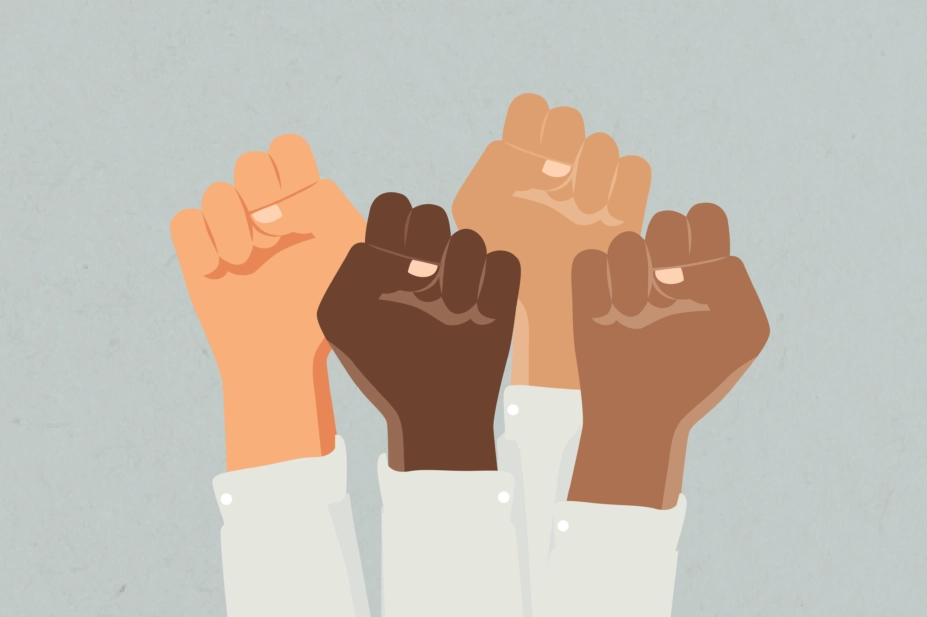
JL / The Pharmaceutical Journal
Until a few years ago, as a black and foreign female hospital pharmacist, I never felt comfortable or safe discussing my experience of racial discrimination. It is a subject that few dare to speak about and, over the past 20 years, I have never worked in a department where the topic has been openly discussed. Until recently, it seemed to me that the issue was never a priority for the pharmacy profession.
With the publication of the discrimination report ‘The “snowy white peaks” of the NHS’[1]
,[2]
, the introduction of the Workforce Race Equality Standard (WRES) from NHS England, and the help of social media, we are beginning to see more examples of people denouncing racism. We’re making progress, but, unfortunately, racism is still taking place in society, the NHS and the pharmacy profession.
During my career, I have had to overcome many roadblocks put in my way by people in power who have ‘felt uncomfortable’ in my presence
Naively, when I first started practising pharmacy in the early 1990s, I believed that if I worked hard there would be no limit to my achievements — I never saw the colour of my skin as an obstacle to my success. But during my career, I have had to overcome many roadblocks put in my way by people in power who have ‘felt uncomfortable’ in my presence and by what I represented.
Experiencing racism
When I took a leadership position, I was determined to be inclusive and tackle the racial inequalities I had witnessed and experienced. I spoke up for others who were discriminated against, bullied and victimised by unfair recruitment processes. As a result, I became a target, and I was criticised and isolated.
I had to hold my line managers to account for encouraging my direct reports to mislead me and complain about me. Opportunities for continuing professional development that I had identified were given to others and my requests were ignored. I was even shouted at and told that I was never going to be what I aspire to be. As a black female leader, I had to put up with behaviours that none of my non-black leaders had to face.
I know of black colleagues who have been turned down for jobs because of ‘lack of experience’ while the non-black successful candidates have had no experience but ‘bags of potential’
Sadly, I am not alone. For instance, at a former place of work, the line manager of a black female colleague once fed back to her that when she laughed, her mouth took a funny shape and she needed to change it. Another line manager told a colleague behind closed doors, but in my presence, that a female black locum pharmacist was something that she “could not explain, but the behaviour is exasperating”. The black pharmacist was eloquent and outspoken — these qualities are not likely to have sat well among many who wanted to label her as an ‘angry black woman’ for daring to speak back. Needless to say, she did not last long in her post.
I know of black colleagues who have been turned down for jobs because of ‘lack of experience’ while the non-black successful candidates have had no experience but ‘bags of potential’. As I myself have experienced, successfully applying for non-mandatory training is always an uphill battle; the common excuse is usually “the time is not right” or “we’re short of staff”, only for black colleagues to pick up extra work to allow non-black colleagues to attend their courses.
In my experience, people with black, Asian and minority ethnic (BAME) backgrounds are also usually the last to learn about ‘door-opening opportunities’ and the ones who seem to need the most feedback. I know of pharmacy leaders who have colluded with other members of staff to bully and push out staff because of the colour of their skin. I also know of BAME professionals who have faced false accusations for the same reason.
A systemic problem
This is a problem across the healthcare system. Despite discrimination legislation and the WRES, BAME professionals are poorly represented in top leadership positions across the NHS; they are more likely to face a disciplinary hearing and detriment; and they are paid less than their white counterparts[2]
,[3]
.
From a freedom of information request I made to the General Pharmaceutical Council (GPhC) in August 2018[4]
, and from data subsequently published by the GPhC[5]
, I know that BAME pharmacy professionals have more often been the subject of concerns raised with the regulator for years. And the composition of the GPhC’s fitness-to-practise committee does not, but should, reflect the ethnic composition of our profession[4]
,[6]
.
Challenging discrimination
The knowledge of leaders getting away with unfair treatment of staff has sometimes robbed me of the joy of practising pharmacy and it can be difficult to know where to turn.
I have never given up fighting, regardless of the cost I have paid for advocating inclusion and equality within our profession. But I have always felt that there is something missing that could support and empower me.
A few years ago, while working in a NHS trust where the BAME experience was very negative and where BAME staff were unwilling to speak openly about their experiences, I started a BAME group to help the trust to comply with NHS England’s WRES. The award-winning multicultural, multiprofessional group included staff representing eight of the nine protected characteristics of the Equality Act 2010. The group was a safe space in which BAME staff felt empowered to share their stories of discrimination in the trust with the chief executive and the medical director — a big step. The group was also open to non-BAME staff and the stories told, and their impact on victims, were shocking to many white staff.
We need a BAME pharmacy association
It is understandable that some BAME pharmacy professionals are hesitant to speak up about racial discrimination. Some believe that claiming racial discrimination can be perceived as using ‘the race card’ to justify failures. Whatever the reason for BAME staff’s reluctance to speak up, the topic is not openly debated. Racial discrimination often goes unchallenged as a consequence.
BAME professionals must come together if we want to fight this discrimination in the profession. We need our own independent voice — an association — to take on this fight. We need a UK Black and Asian Pharmacy Association that will allow us to celebrate and teach each other about our cultural differences and needs. I know of racial tension and discrimination among BAME groups caused by ignorance and false beliefs. We must listen to each other’s stories and speak about how the existing discrimination affects us all.
There is a national BAME Pharmacy Leadership Network[7]
and I encourage all BAME pharmacy professionals to join it, but we need a wider platform from which we can coordinate the difficult conversations that must take place in all areas of the profession, including undergraduate studies.
A BAME organisation could pave the path for the next generation of BAME leaders, enabling us to highlight role models and send the lift down once we reach the top
For example, BAME doctors have incredibly politically active groups, including the British International Doctors’ Association and British Association of Physicians of Indian Origin. A BAME organisation could pave the path for the next generation of BAME leaders, enabling us to highlight role models and send the lift down once we reach the top. Mentoring BAME professionals and denouncing racial discrimination should be a priority of such an association. It should denounce all those who have reached the top only to turn a blind eye and a deaf ear to wrongful actions – including some BAME leaders themselves.
I want to be proud of the profession I practise. In my spare time, I collaborate with a group of doctors, lawyers and other professionals in visiting our local secondary schools to encourage students to apply for university degrees. I want to be able to tell prospective BAME pharmacy students that if they choose pharmacy, they will join a fair and inclusive profession; that, if they apply themselves, hard work will be rewarded regardless of the colour of their skin. I can’t tell them that yet, but establishing a UK Black and Asian Pharmacy Association would be the first step in making this happen.
Elsy Gomez Campos is lead pharmacist for specialised clinical commissioning at NHS England, working across three NHS trusts in Essex. If you are interested in discussing the ideas raised in this article, get in touch at: e.gomezcampos@nhs.net
Racial discrimination is unlawful under the Equality Act 2010. If you have experienced racism at work, find out your employer’s policy on equality and discrimination, and seek guidance from Citizens Advice at www.citizensadvice.org.uk and Acas (the Advisory, Conciliation and Arbitration Service) at www.acas.org.uk
References
[1] Kline R. The ‘snowy white’ peaks of the NHS: a survey of discrimination in governance and leadership and the potential impact on patient care in London and England. 2014. Available at: http://www.mdx.ac.uk/__data/assets/pdf_file/0015/50190/The-snowy-white-peaks-of-the-NHS.pdf.pdf (accessed November 2018)
[2] NHS England. NHS workforce race equality standard: 2017 data analysis report for national healthcare organisations. 28 March 2018. Available at: https://www.england.nhs.uk/publication/nhs-workforce-race-equality-standard-2017-data-analysis-report-for-national-healthcare-organisations (accessed November 2018)
[3] Appleby J. Ethnic pay gap among NHS doctors. BMJ 2018;362:K3586. doi: 10.1136/bmj.k3586
[4] Ethnicity data. Freedom of information request made by the author on 10 August 2018 to the Information Governance Team of the General Pharmaceutical Council. Information obtained can be made available on request.
[5] Wilkinson E. Asian and Black pharmacists overrepresented in fitness-to-practice concerns, GPhC data show. The Pharmaceutical Journal 2018;301(7917):135. doi: 10.1211/PJ.2018.20205451
[6] General Pharmaceutical Council. Fitness to practise committee members. Available at: https://www.pharmacyregulation.org/raising-concerns/hearings/committees/committee-members (accessed November 2018)
[7] BAME Pharmacy Leadership Network on Twitter. Available at: https://twitter.com/BameNetwork (accessed November 2018)


